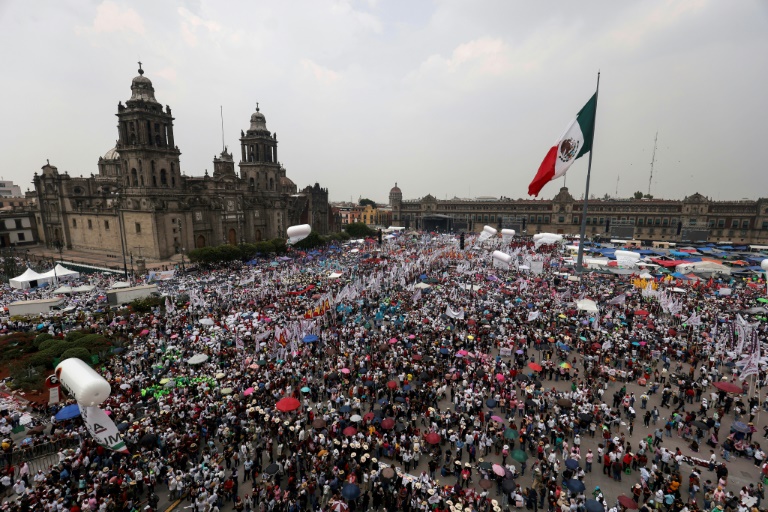Mexico's next presidential election campaign reached a climax on Wednesday, with two women leading the presidential race for the first time in the violence-plagued Latin American country.
Barring a major upset, millions of Mexicans will vote on Sunday in what appears to be a near certainty to elect a woman leader of the world's most populous Spanish-speaking country.
In a country with a history of gender inequality, the ruling leftist candidate Claudia Scheinbaum and the centre-right opposition candidate Xochitl Gálvez, both 61, have dominated the presidential election.
About three months into the official campaign, Scheinbaum, a former Mexico City mayor and scientist, is the leading candidate with 53 percent of voters' support, according to a poll by research firm Oraculous.
Opposition rival Xochitl Gálvez, an outspoken senator and businesswoman with indigenous roots, came in second with 36 percent.
The only candidate, the unlikely centrist Jorge Álvarez Mines, received 11 percent of the vote.
Thousands of supporters gathered in Mexico City's main square on Wednesday to hear Scheinbaum speak, many of them wearing purple, the color of the leader of the ruling Morena party.
“The people have woken up. We don't want to be robbed any more by the old regime because the poor come first,” said Soledad Hernandez, a 23-year-old housewife from the southern state of Oaxaca.
A big factor in Mr. Sheinbaum's popularity is outgoing President Andrés Manuel López Obrador, a close ally of Mr. Sheinbaum's who is also a leftist but only served one term despite having an approval rating of more than 60 percent.
Galvez chose the northern industrial city of Monterrey for his final rally.
“If Claudia (Sheinbaum) wins, we will see the same thing happen as Lopez Obrador, who is trying to sink Mexico and turn it into another Venezuela,” said Berta Diaz, 71, a supporter of Galvez.
The country of 129 million people is holding its largest election ever, with nearly 100 million people registered to vote for a new president, members of Congress, state governors and local officials.
About 27,000 troops and National Guard troops are expected to be deployed to step up security on Election Day following a series of violent incidents targeting local candidates.
At least 22 people running in local elections have been killed since last September, according to official figures.
Some non-governmental organizations report even higher figures, with Data Civica tallying up 30 killings of local politicians.
Criminal violence, which has killed more than 450,000 people since 2006, will be one of the major challenges facing the next president, along with immigration and a fragile relationship with neighboring America.
Sheinbaum pledged to continue Lopez Obrador's controversial strategy of attacking crime at its roots, a strategy he called “hugs, not bullets.”
Galvez, who often talks about his childhood growing up in a poor rural town in central Mexico, has declared that his “embracing of criminals is over” and vowed a tougher response.
jg-dr/bjt

